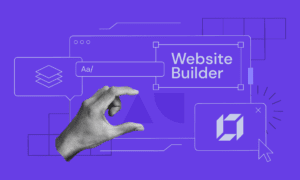Picking the right website builder can feel like a big task, especially with so many options out there. Whether you’re launching a personal blog, a portfolio, or a full-blown online store, the builder you choose is going to shape how your site looks and works. It’s not just about price or features; it’s about finding something that fits your needs now and can grow with you in the future. In this article, we’ll break down what you need to consider so you can make the best choice for your web project.
Understanding Your Website Needs
Before diving into the world of website builders, it’s important to first understand your specific needs. This involves taking a closer look at what you want your website to achieve, your technical capabilities, and the budget you have in mind. Let’s break it down step by step.
Define Your Website’s Purpose
Start with the basics: Why are you creating this website? Is it for sharing your thoughts through a blog, showcasing your creative work, or perhaps selling products online? Different goals require different features. A blog might need a strong comment system, while an eCommerce site needs shopping cart functionality. Knowing your purpose helps you prioritize the features you need.
Identify Your Technical Skills
How comfortable are you with technology? Your level of tech-savviness will influence the type of website builder you should choose. If you’re just starting out and don’t know much about coding, look for a builder with a simple drag-and-drop interface. For those with more experience, a platform that allows for custom coding might be more appealing.
- Beginners: Opt for builders with intuitive drag-and-drop editors.
- Intermediate: Consider platforms that offer some coding flexibility.
- Advanced: Look for builders that support extensive customization through HTML, CSS, and JavaScript.
Determine Your Budget
Budgeting is a big part of choosing the right website builder. Prices can vary widely, so it’s vital to know what you’re willing to spend. Remember, the cheapest option isn’t always the best. Consider the long-term value and what features are included in the price. Some platforms might seem affordable initially but could end up being costly when you factor in add-ons and necessary upgrades.
Think of your website as an investment. Spending a bit more upfront could save you headaches down the line if it means getting a platform that grows with your needs.
Evaluating Key Features of Website Builders
Ease of Use and User Experience
When it comes to picking a website builder, ease of use is a top priority. You want a platform that’s intuitive, so you don’t spend hours figuring out how to do basic tasks. Look for builders with drag-and-drop functionality, which lets you arrange elements on your site without needing to know any code. Some platforms even offer guided tutorials or wizards to help you get started.
- Drag-and-drop editors
- Intuitive navigation
- Guided tutorials or setup wizards
Design Flexibility and Templates
Design flexibility is another key feature. You’ll want a range of templates to choose from, whether you’re building a simple blog or a full-fledged eCommerce site. Make sure the templates are customizable, so you can tweak them to fit your brand. Some builders provide access to HTML/CSS for more advanced users who want to make detailed adjustments.
- Wide range of templates
- Customizable design options
- Access to HTML/CSS for advanced users
SEO and Marketing Tools
SEO and marketing tools are crucial for getting your site noticed. Search engine optimization features help improve your site’s visibility on search engines like Google. Look for builders that offer built-in SEO tools, such as meta tags, alt text for images, and easy URL customization. Some platforms also integrate with marketing tools, like email campaigns and social media.
- Built-in SEO tools
- Integration with marketing tools
- Customizable URLs and meta tags
Choosing the right website platform is essential for ensuring responsive design and mobile compatibility, which greatly influence user experience and search engine rankings.
When evaluating website builders, keep these features in mind to make sure you pick one that aligns with your needs and goals.
Comparing Pricing and Value for Money
Understanding Pricing Plans
When you’re picking a website builder, understanding the pricing plans is key. Most builders offer a range of plans, from basic to premium, and each comes with its own set of features. It’s crucial to know what you’re getting for your money. Some plans might include a free domain, SSL certificates, or even eCommerce capabilities, while others might charge extra for these features. Look out for any hidden costs that could sneak up on you, like transaction fees or limits on bandwidth.
Assessing Long-term Costs
It’s not just about the upfront cost; think about the long-term expenses too. Some website builders might have a low initial price but could become costly over time with add-ons or increased rates after an introductory period. Consider whether the builder offers discounts for annual subscriptions instead of monthly payments. Also, think about future upgrades you might need as your site grows.
Finding the Best Value
Price isn’t everything; value matters more. A cheaper plan might not offer the tools you need to succeed, while a slightly more expensive one could provide everything you need to grow your site. Evaluate what each plan offers and how those features align with your goals. Think about the support, the ease of use, and the scalability of the platform. Sometimes, spending a bit more upfront can save you money and headaches in the long run.
Picking the right website builder isn’t just about the cost—it’s about finding a balance between price and the tools you need to achieve your online goals. Always weigh the benefits against the costs to find the best fit for your needs.
Exploring Advanced Features and Scalability
Integrating eCommerce Solutions
When you’re picking a website builder, it’s crucial to think about eCommerce if you’re planning to sell stuff online. Some builders come with built-in tools that make setting up an online store a breeze. They might offer features like shopping carts, payment gateways, and inventory management. If you’re thinking about selling across different platforms, look for builders that support multi-channel selling. This way, you can manage sales from your website, social media, and marketplaces all in one place.
Utilizing AI and Automation
AI and automation can save you tons of time and effort. Some website builders now offer AI tools that can help with content creation, design suggestions, and even customer service through chatbots. Imagine having a virtual assistant that can whip up product descriptions or suggest layout changes based on current design trends. Automation can streamline repetitive tasks, leaving you more time to focus on growing your business.
Ensuring Future Growth
Planning for the future is a smart move. Even if you’re starting small, think about where you want your website to go. A scalable website builder can grow with you, offering more features and bandwidth as your needs increase. Consider things like additional plugins, extra storage, or increased traffic capacity. Scalability means you won’t have to switch platforms later, which can be a hassle. Instead, you’ll be prepared to handle more traffic, more sales, and more content as your site expands.
Remember, choosing the right website builder isn’t just about what you need today. It’s about thinking ahead and picking a platform that can grow with you. Make sure it has the advanced features you might need tomorrow, so you’re not caught off guard as your business evolves.
Testing and Choosing the Right Platform
Taking Advantage of Free Trials
Before you dive into a commitment with a website builder, it’s smart to take it for a spin first. Most builders offer free trials. This is your chance to check out the features and see if the platform feels right for you. You can experiment with the tools, try designing a page, and really get a feel for how user-friendly it is. Don’t skip this step—it can save you from future headaches.
Reading User Reviews and Testimonials
User reviews are like a sneak peek into the real-world experience of using a platform. They can tell you about the quirks and perks that you might not notice at first glance. Look for reviews that mention both the good and the bad, so you get a balanced view. Remember, one person’s nightmare might be another person’s dream tool.
Making an Informed Decision
Once you’ve tested the waters and read what others have to say, it’s time to make a decision. Consider what features are most important for your needs, and weigh them against the cost and support options. Making the right choice now can save you from a lot of hassle down the road. It’s all about finding that sweet spot between functionality and price.
Making a choice about a website builder is like picking a new pair of shoes. It needs to fit well, look good, and be comfortable for the long haul. Take your time, try a few on, and don’t rush into a decision just because something is shiny or on sale.
Avoiding Common Mistakes When Choosing a Website Builder
Not Considering Future Needs
When you’re picking a website builder, it’s easy to get caught up in the now—what you need right this second. But remember, your website will grow and change over time. If you choose a platform that doesn’t allow for easy expansion, you might hit a wall later. Think about what your website might need in a year or two. Will you want to add more pages, a blog, or maybe even an online store? Choosing a builder that’s flexible will save you headaches down the road.
Overlooking Customer Support
Customer support might not seem like a big deal until something goes wrong. Having reliable customer support can be a lifesaver. Imagine your site crashes right before a big launch or sale. You’ll want a team that’s ready to help at a moment’s notice. Check what kind of support is available—24/7 chat, email, phone—and read reviews to see how responsive they are.
Ignoring Mobile Responsiveness
These days, more people are browsing on their phones than on computers. If your site doesn’t look good on a mobile device, you’re in trouble. Make sure the website builder you choose offers mobile-responsive templates. It’s not just about looking good; it’s about functionality. Test how easy it is to navigate your site on a phone. If you find yourself pinching and zooming a lot, that’s a red flag.
Think long-term when choosing a website builder. Your needs today might not be the same tomorrow, and a little foresight can prevent a lot of problems.
Wrapping It Up: Choosing Your Ideal Website Builder
So, there you have it. Picking the right website builder is all about knowing what you need now and what you might need later. It’s like picking a pair of shoes—you want them to fit well today, but also be comfy enough for a long walk tomorrow. Whether you’re starting a blog, setting up an online store, or just want a simple site to showcase your work, there’s a builder out there for you. Just remember to think about your goals, budget, and how easy the builder is to use. And don’t forget to test it out first! With a little bit of planning and some trial and error, you’ll find the perfect fit for your website needs. Happy building!
Frequently Asked Questions
What is a website builder?
A website builder is a tool that helps you create a website without needing to know how to code. It usually offers templates and drag-and-drop features to make designing easy.
Why is choosing the right website builder important?
Choosing the right website builder is important because it affects how your website looks and works. A good builder can help your business grow and meet your goals.
How do I decide what features I need in a website builder?
Think about what you want your website to do. If you want to sell stuff, look for eCommerce tools. If it’s a blog, you’ll need good text and image options.
What should I consider about the cost of a website builder?
Consider both the starting price and any extra costs for features or support. Make sure it fits your budget now and in the future.
Can I change my website builder later?
Yes, but it can be hard. It’s easier to start with the right builder, so choose one that can grow with your needs.
How can free trials help in choosing a website builder?
Free trials let you test the builder to see if you like how it works. It’s a good way to make sure it meets your needs before you buy.

































